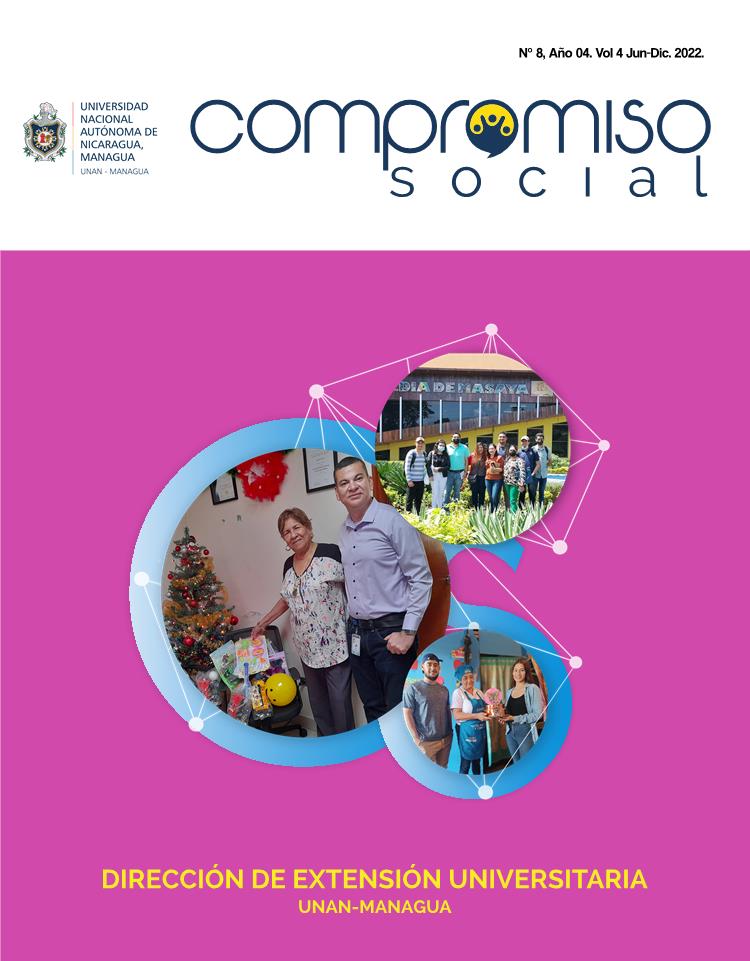Medical Brigade a transformative experience in the community and the family
DOI:
https://doi.org/10.5377/recoso.v4i8.18619Keywords:
Health/illness, brigade, attention, biopsychosocial, multi-disciplinaryAbstract
The Dot House Health Medical Brigade of the Superemos Foundation has been part of the community health program for 22 years, working both in urban and rural areas, which has allowed the development of a good working relationship with FAREM-Estelí and the Ministry of Health (MINSA), which has represented a development opportunity for families and communities. The systematization corresponds to the qualitative paradigm, the focus is focused on a process of participatory intervention. Due to the type of experience, it is a systematization of programs. The protagonists were: (inhabitants of the communities of Licoroy and Las Gavetas, students, national and international staff, and Superemos) who, through interviews, a workshop, and a free listing, shared their experiences of community health development. The information was classified based on axes, categories and subcategories, after the critical and interpretative analysis stage, the conclusions, lessons learned and recommendations were identified. The results show that community care from the brigade has had a biopsychosocial approach that has contributed to family and community development; It concludes with a methodological proposal (biopsychosocial route) as a guide for community health care integrated by a multidisciplinary team.
Downloads
References
Cajina , D. (12 de Noviembre de 2021). Somos UNAN-Managua. Recuperado el 20 de Enero de 2022, de https://www.unan.edu.ni/index.php/articulos-entrevistas-reportajes/practicas-medicas-comunitarias-un-gran-aporte-a-la-salud-nicaraguense.odp#:~:text=Seg%C3%BAn%20el%20libro%20Salud%20comunitaria,individuos%2C%20las%20familias%2C%20el%20medio
Casanova, J. F. (Julio de 2017). Factores asociados en la percepción del médico sobre la relación médico-paciente. Horizonte Médico, 7. Recuperado el 10 de Septiembre de 2022, de http://www.scielo.org.pe/scielo.php?script=sci_arttext&pid=S1727-558X2017000300008
Castell-Florit, P. (2010). Cubana de Higiene y Epidemiologia . Obtenido de http://scielo.sld.cu/scielo.php?script=sci_arttext&pid=S1561-30032010000100001
Daraio, M. (2021). Tiempo, comunicación y medicina narrativa. Alergia e Inmunología Clínica, 60-62. Recuperado el 22 de Noviembre de 2022, de http://adm.meducatium.com.ar/contenido/articulos/27900600062_2109/pdf/27900600062.pdf
Louro, I. (Mayo-agosto de 2011). Enfoque familiar en el análisis de la situación de salud. Cubana de Higiene y Epidemiología. Recuperado el 4 de Diciembre de 2021, de http://scielo.sld.cu/scielo.php?script=sci_arttext&pid=S1561-30032011000200001
Maristany, L. (2008). El poder terapéutico de la escucha en medicina crítica. Humanitas Humanidades Médicas. Recuperado el 21 de Noviembre de 2022, de https://dialnet.unirioja.es/servlet/articulo?codigo=6709477
Rodríguez, M. (2001). Retos a la Psicología en el tratamiento de la categoría de estilo de vida en el proceso Salud- Enfermedad. Cubana Psicologia. Recuperado el 6 de Diciembre de 2021, de http://pepsic.bvsalud.org/pdf/rcp/v18n1/02.pdf
Tamayo , M. (2017). Trabajo en equipo: relevancia e interdependencia de la educación interprofesional. Saùde Pùblica. Recuperado el 4 de Diciembre de 2021, de https://www.scielo.br/j/rsp/a/dZG5Rm8kjSFKLT5PqSVFPpG/?format=pdf&lang=es#:~:text=Los%20equipos%20multidisciplinarios%20deben%20superar,sus%20familias%2C%20cuidadores%20y%20comunidade
Downloads
Published
How to Cite
Issue
Section
License
Copyright (c) 2022 Universidad Nacional Autónoma de Nicaragua, Managua(UNAN-Managua)

This work is licensed under a Creative Commons Attribution-NonCommercial-ShareAlike 4.0 International License.




